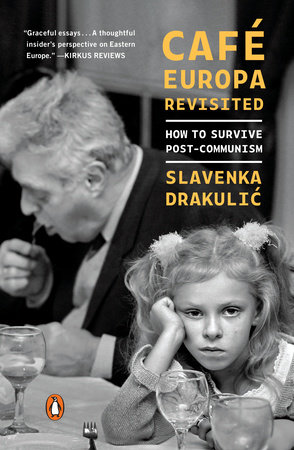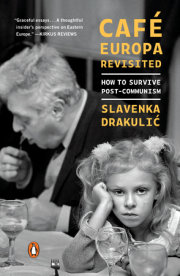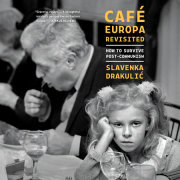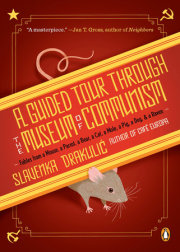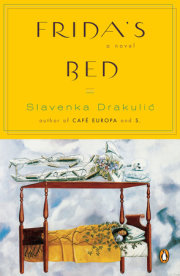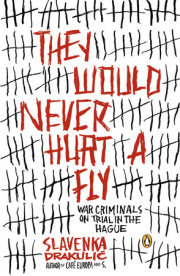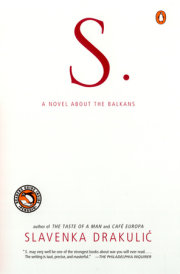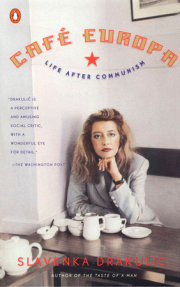ONCE UPON A TIME IN 1989
The Berlin Wall had already fallen and the people in Eastern Eu-rope were celebrating the new era without communism. But the news did not seem to concern Romanian dictator Nicolae Ceausescu until the last day he ever addressed his people, December 21, 1989. A close- up on camera caught him at the exact moment when he realized that the tide was turning against him, that people are no longer applauding and cheering, but booing him. His shock and the disbelief I saw in that face will stay with me forever as an iconic picture of the change.
Apparently, people rarely see the big picture or immediately understand the real meaning of events they witness. In the case of the fall of communism, the dominating feeling at the time, it seems to me, was surprise. Joy came only afterward, mixed with a bit of suspicion.
Such fragmented pictures and emotions deeply deposited in our memory. The whole big earthquake, its causes and consequences, escaped us then only to come back later as history. Therefore it becomes important how we remember it, if there are discrepancies and gaps, like we know it from the old times.
Indeed, a discrepancy that comes to my mind when remember-ing 1989 is the one between history and fantasy. There was a cer-tain innocent naïveté sweeping over Eastern Europe, the hope that the fall of communism would be, in some way, a guarantee that we would live happily ever after. The reason I call it innocent is that we really didn’t know what to expect, but we knew what we wanted: glitter and glamour, like on the other side, in the West. What else could we think of, but sheer old- fashioned magic, as in a provincial circus performance? Or in fairy tales for that matter. In our perception, what had just happened was nothing but a fairy tale, in which a poor young man, overcoming insurmountable ob-stacles put in his way by the princess’s father, wins her heart and becomes a king himself. What other concept— or, indeed, “narra-tive,” as it is called today— did we know? Democracy was a vague and distant idea, a theory never to be reached in practice. Human rights even more so. And capitalism we understood only as far as supermarkets full of incredible food and unknown trifles took us. That was a reality we could touch and smell, consume, buy, possess— the very measure of our success. Hard work for little money, poverty and jobless people were not part of that parcel.
We had no experience of the new world opening up to us; we had only dreams made of TV images, movies, rumors about freedom of expression, finely wrapped chocolates and the glowing lights of shopping windows in Vienna or Paris.
There is another reason I think we were naive: the belief that such a dramatic change, the collapse of an entire political system, would go smoothly and gently, with few victims and limited conflict. We did not foresee the profound changes that were in the making, including the fact that they were of two kinds: progres-sive, modern, liberal, tolerant— as well as the opposite. The coin had two sides, on one democracy and freedom, on the other exploitation and poverty. Maybe it was simply easier to believe in the new reality and not question it, to embrace luxury more than democracy, greed more than human rights. Even if our fantasy about “Europe” and all that it meant did not last long.
Underneath the big change, a reaction to it was going on. When the earth trembles under your feet, you look for security in what you know, in what you remember, in what was there before communism collapsed.
But what was actually there to fall back on? Not much, but there were two strong pillars of collective identity: the national and the religious. Even during communism, although suppressed, national identity was preserved in language and culture. And there was re-ligion, in some nations more important, in others less. It was an inseparable part of national identity, although expressed more in the form of tradition and culture than as regular religious practice. Indeed, national identity and religion came to dominate public discourse very soon after 1989— to the surprise of the people and politicians in the West, where nationalism (they believed back then!) belonged to the past and religion was considered a purely private affair. At first, it seemed to them as if the Eastern Europeans were not only coming from a different place, they were coming from another time too.
But that was not the only misunderstanding. The perception of our mind- set or mentality was just as problematic. It is more difficult to explain and hard to pinpoint exactly what this phenomenon is about, but it is vital to understand Eastern Europeans from a psychological point of view. In 1989, most of them had spent a big part of their lives under communism. This experience, common to all, formed their values and perceptions, their habits and expectations— in short, their worldview. It formed a specific kind of mentality— and while a political regime might be changed over-night, that mentality cannot. To alter it takes time; indeed, generations.
In the new post- communist reality, joy was soon accompanied by a feeling of disappointment triggered by growing poverty and the gap between those who made a fortune when state property was privatized and the extremely poor, by corruption, and by a distrust of the political elite as well as of the impermeable EU bureaucracy. No doubt, there were many positive changes, of which access to all sorts of new products was the only one embraced unanimously, just like in the West. Stability was replaced with the mobility of goods, businesses and people. But when you have freedom of movement but no money to travel, that freedom will in the end, in your eyes, be devalued. “Europe” did not live up to our fantasies, because such fantasies could never become reality. Instead, it was accused of neocolonialist exploitation, for creating economic injustice, for the lack of jobs and the democracy deficit or for simply not sending us enough money.
In the meantime, we learned the hard way that we are not the same kind of Europeans, that some are more European than others. Living in the periphery and coming from another time simply make you a second- class European. Like laundry detergents or canned food in our supermarkets: the brand name is the same, but the quality is not. It feels like a slap in the face, but it is also a good metaphor: What more proof of inequality?
But if you take a look at Eastern Europe from the west side, you could see that we are unequal in something else, in pervasiveness of corruption. I found it captured beautifully in a single film from 2016,
Graduation, by the Romanian director Cristian Mungiu. The main character, Romeo, is a medical doctor in his midforties. He belongs to a generation that believed in the transition and in principles such as truth and decency, that believed that reality can change if we stick to rules, if we ourselves are better people. His idealism fades away, but one hope remains: his daughter, Eliza. She was brought up with high principles, prepared to study and live in Great Britain. She gets a grant, but the fulfilment of his (not her!) dream depends on her passing the final exams. This should just be a formality for such a bright student, but on the very day when the exams start, Eliza becomes the victim of attempted rape, which leaves her traumatized, and she is unable to perform. Realizing that his daughter’s future is at stake, Romeo embarks on a long journey of corruption— something he fought against all his life. You can see that corruption permeates every cell of Romanian society, from the school to the police, from the ministry to the hospi-tal and the financial inspectors. Now Romeo is caught in a web and we see how corruption influences him on a very personal level— for without it there is no way for him to reach his aim.
Romania is in the EU, it is a democracy, there is capitalism— yet only on the surface. When you scratch it, the real Romania shows through and it doesn’t appear to be much different than it was twenty- five years ago, when party membership and VIP con-nections were the means of survival and the main currency of corruption. This goes for most other Eastern European societies, really. And it was my generation that couldn’t get rid of it. There is corruption in the West too, but there is a difference between the individual cases of corruption in the West and corruption as a system, the way society functions in the East. This hasn’t changed, not even in twenty- five years. This film left me with a bitter taste of defeat. Having no hope for change is perhaps the biggest loss of the next generation. No wonder so many are depressed. Others are leaving, some 20 percent of them from Romania alone.
Donald Trump became the president of the United States, Brexit looms over the EU like a dark cloud; the politics of exclusion are becoming mainstream, and nationalism and nativism are on the rise, together with razor- wire fences on the EU’s borders and a “great wall” in the United States; support for right- wing parties in France, the Netherlands and even Germany is growing and threatening European unity; the burden of refugees is not being fairly distributed; the war in Ukraine and the Russian annexation of Crimea have created a feeling that Russia has yet again become a real threat to Europe. It seems that the European Union is in dan-ger of falling apart, the member states being unable to agree on and confront a single important issue. We see confusion and feel uncertainty, but we do not get the whole picture. The changes are many and they happen fast; yesterday’s explanations are no longer valid.
Only a few years ago, Europe was a quite different place. Today’s problems were surely there, but the feeling was different, there was energy in the air. New countries wanted to join the EU, there was a desire to include Ukraine at least in trading, and the EU was still promising peace and security, emanating values to aspire to and possibilities for a better life for everybody.
In my part of Europe, on one level we were trying to adapt and emulate European standards and expectations. However, at the same time we built a psychological defense mechanism of collective identity based on nation and religion. There was not much more there with which we could confront the new situation. In the concept of national identity all the disappointments with the EU were summed up, the frustration coming from our position in the Union, fear of globalization, fear of immigrants who appeared as new, more needy victims, ready to take our place.
Copyright © 2021 by Slavenka Drakulic. All rights reserved. No part of this excerpt may be reproduced or reprinted without permission in writing from the publisher.

